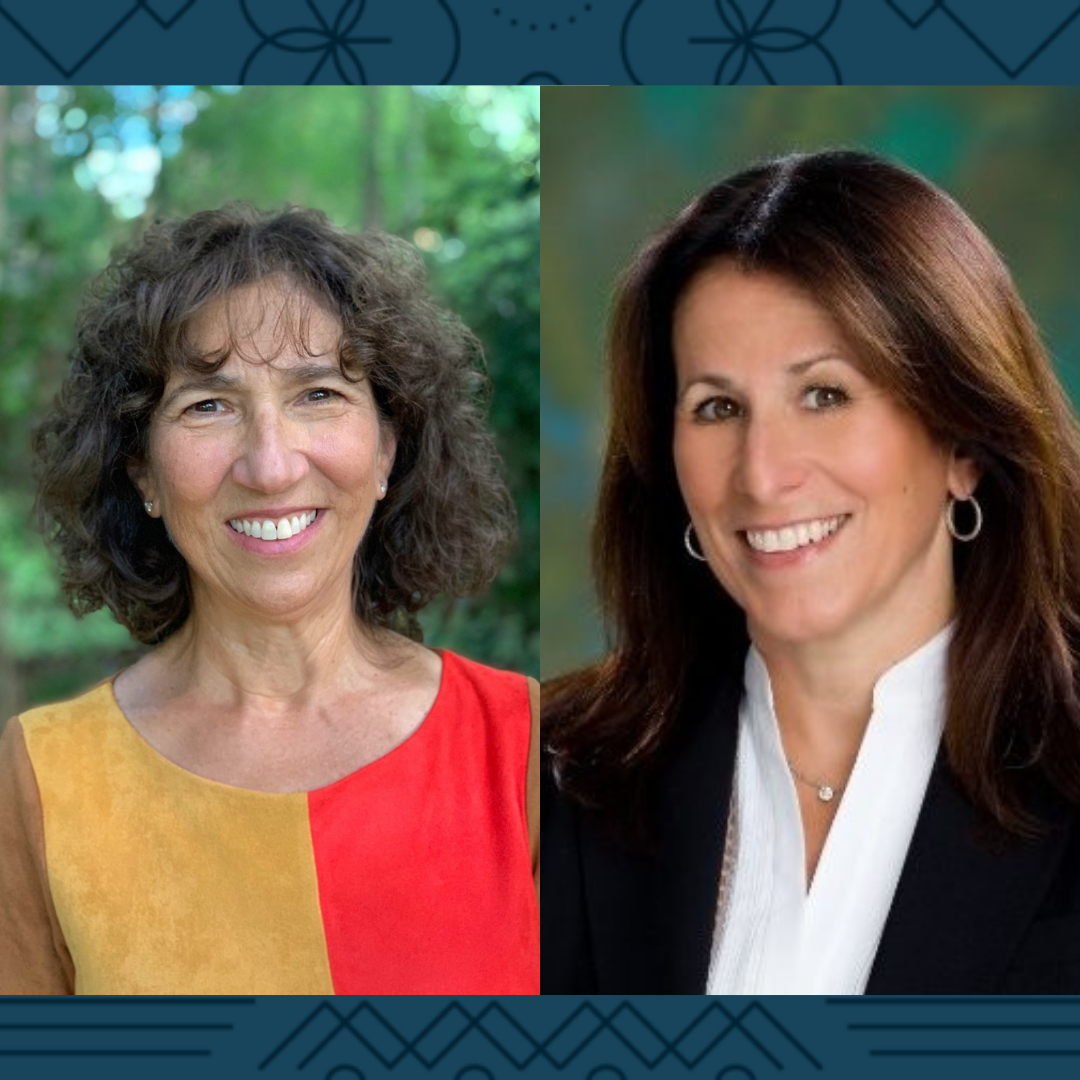
Did you miss the live stream of this event? You can watch the recording here.
Did you miss the live stream of this event? You can watch the recording here.
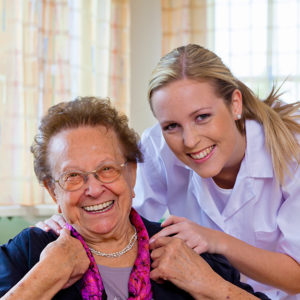 A hybrid approach to programming, combining in-person and virtual events is likely to remain a strong option after the pandemic. That’s especially true for older adults, and AgeWell Atlanta is leading the way.
A hybrid approach to programming, combining in-person and virtual events is likely to remain a strong option after the pandemic. That’s especially true for older adults, and AgeWell Atlanta is leading the way.
Ashley Maloy who manages the AgeWell Atlanta Neighborhoods program said, “Seniors are requesting virtual programs. During the pandemic older adults gained new technological skills that empowered them to use tablets and computers. Virtual programming also helps increase contact between older adults who live in different parts of Atlanta. Toco Hills residents didn’t want to drive to the JCC but they loved the virtual fitness classes and seeing friends they wouldn’t have seen otherwise.”
AgeWell Atlanta offers a robust calendar packed with 18-20 programs a week! Click below to see what’s coming up in June. RSVP and get virtual links for upcoming events by contacting Ashley Maloy.
Monday, June 7 | 3:15 pm | Entertainment with Daniel Weiser
Daniel Weiser, pianist and Artistic Director of Amici Music, will present a special Zoom program along with violinist Tim Schwarz entitled Broadway Violin. It will feature some wonderful arrangements of your favorite Broadway hits from the 1920’s to the 1960’s by Gershwin, Arlen, Rodgers, Bernstein, and more.
Monday, June 8 | 11:30 am | Smart Moves Panel
We are fortunate to be living in a time when life expectancy is far beyond what our ancestors could have dreamed of! With a little careful planning these precious extra years can be filled with joy, happiness, and comfort. Join our team of experts to learn about how to plan for the unexpected. We will cover the topics of Medicare, Legal Needs, Housing, and Living Situations.
The Panel Will Include:
Kelley Napier with Brannon Napier Elder Law
Keith Nabb with Affordable Medicare Solutions
Lucretia Farley and Donna Cardenas with Atlanta Communities Real Estate
Caroline Ventry with A Place for Mom
RSVP: https://agewellatl.org/smartmoves/
Wednesday, June 23 | 3:15 pm | High Museum of Art — The Evolution of Visual Storytelling
Come along as we explore how storytelling through images has evolved over time with Amanda Williams of the High Museum. We’ll travel from the 17th century through today and consider how context shapes the types of stories told and the methods artists employ in sharing their narratives.
 Lana Severinsky is one of PJ Library’s Russian Community Coordinators. It’s been her job to spread the word that generous tuition grants are available for kids from Russian speaking Jewish families (RSJ) to attend Jewish overnight camps this summer. The grants are made possible with the generous support of Genesis Philanthropy Group in partnership with the Foundation for Jewish Camp (FJC).
Lana Severinsky is one of PJ Library’s Russian Community Coordinators. It’s been her job to spread the word that generous tuition grants are available for kids from Russian speaking Jewish families (RSJ) to attend Jewish overnight camps this summer. The grants are made possible with the generous support of Genesis Philanthropy Group in partnership with the Foundation for Jewish Camp (FJC).
Lana’s eight-year-old daughter Vera received an RSJ Camp Access grant and is “beyond excited” go to Camp Coleman in just a few weeks! “My wish for Vera is that camp gives her a sense of the larger Jewish community. She has some Jewish kids in her class, but I want her to understand Jewish peoplehood — what it is to have Shabbat with all your friends, to sing and dance, and feel pride in being Jewish.”
Elina Brager came to Atlanta from the former Soviet Union 30 years ago at age 18. Opportunities to experience Jewish religion and culture were extremely limited in Russia and there was no such thing as Jewish camp when she was growing up. “Going to camp was just not something Jewish families did. Now the most important thing for me and my family is that we learn our Jewish heritage and celebrate it. That’s why my daughter Naomi is a student at The Epstein School and why we wanted her to go to Ramah Darom the summer before the pandemic. Camp tuition has increased, so this grant makes it possible for Naomi to return.”
“Naomi really grew at camp. She matured. She felt the joy of being Jewish. Her world expanded. I could see how connected she felt to her friends, to Jewish culture. We are so grateful that she’ll be able to go back to camp this summer.”
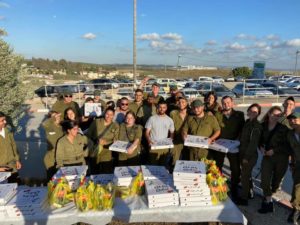 We are relieved that the ceasefire is holding, and we thank G–d that life is getting back to normal here in Israel. However, we experienced a tremendous loss with the death of Omer Tabib. Omer Tabib was born in Moshav Elyakim and was the eldest of Tali and Amir Tabib’s two children. Omer was killed by an anti-tank missile in the Gaza Perimeter, while patrolling near Moshav Netiv Ha’asara.
We are relieved that the ceasefire is holding, and we thank G–d that life is getting back to normal here in Israel. However, we experienced a tremendous loss with the death of Omer Tabib. Omer Tabib was born in Moshav Elyakim and was the eldest of Tali and Amir Tabib’s two children. Omer was killed by an anti-tank missile in the Gaza Perimeter, while patrolling near Moshav Netiv Ha’asara.
Itzik Holovsky, head of the Megiddo Regional Council remembered Omer with these words: “A terrible disaster fell on us yesterday, out of the blue. The heart is torn and the head refuses to believe. There is no consolation for the terrible loss. It doesn’t make sense and it’s not normal for a father to read Kaddish for his son. Omer Tabib was killed at the gates of Gaza by a missile fired by the damned and vile Hamas. Omer was active in B’nei Akiva, an outstanding student at Hatikva School in the Moshav and the Megiddo High School and was loved by everyone. An excellent athlete, a talented water ball player, he was an outstanding soldier who received the IDF award from his unit. In just another month he was supposed to be released – how terrible, how painful!”
Read on for an update on how we are faring in Yokneam and Megiddo after the bombardment.
Supporting IDF soldiers from the Elyakim Base: There is an army base in our region that is very close to Moshav Elyakim. The Partnership steering committee decided to support the soldiers on the base and show them how much our communities think about them during this challenging time. Committee members, who had participated in fundraising courses supported by Federation, raised 2,100 ILS in four days and delivered 60 trays of pizza and drinks to the soldiers. Rebecca, our new steering committee member who was the champion of this initiative said, “Today we had the honor of delivering and handing out 60 pizzas plus drinks to Base Elyakim. We got to chat with the soldiers and they literally could not stop thanking us. Within minutes it was gobbled up! There were some serious smiles and laughter.”
Supporting Atlanta & St. Louis Lone Soldiers: The connection between the Partnership Region, Atlanta, and St. Louis IDF soldiers was strengthened during this operation. The “adoptive” families of our Lone Soldiers and our committee members called each of them to make sure all was okay and to see how we can help. June 10 will mark our first visitors in the region after COVID-19, from Hillels of Georgia. Seven soldiers confirmed their participation for dinner in our region. There are also videos and letters that schools created for the soldiers, such as this one from The Davis Academy:
Megiddo is hosting teens from the south: The Megiddo Regional Council is hosting 150 teens from the south of Israel for a respite from the challenging situation. There is real need to help the teens recover from these difficult times, and Megiddo is helping to provide that. The Federation of St. Louis helped with funding part of the costs of the meals for the teens.
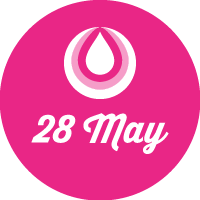 The average length of a menstruating person’s period is five days. The average length of a menstrual cycle is 28 days. Those numbers inspired advocates around the world, and our own Women’s Philanthropy activists, to declare Menstrual Equity Day on 5/28.
The average length of a menstruating person’s period is five days. The average length of a menstrual cycle is 28 days. Those numbers inspired advocates around the world, and our own Women’s Philanthropy activists, to declare Menstrual Equity Day on 5/28.
Providing menstrual supplies to Atlantans who cannot afford them has been a major focus of Women’s Philanthropy for more than a year. Through Project Dignity, our women have engaged friends, families, and Jewish teens from JumpSpark to collect and distribute more than 100,000 menstrual supplies across Atlanta. Lori Peljovich, who helps lead the initiative says, “It’s been a great hands-on way to have an impact during the pandemic because much of the shopping can be done online. I’ve been so impressed by the women of our community when asked to step up and engage.”
“Project Dignity has been so successful that we’ve been able to partner with a number of organizations in our community to expand our reach,” Peljovich said. “We were overwhelmed by the response, and we will try to do collection drives twice a year in order to keep increasing our distribution to those in need.” To get involved contact: Yael Sherman, Director of Women’s Philanthropy, ysherman@jewishatlanta.org
Some surprising facts about menstruation equity:
According to NY Rep. Carolyn Maloney, 2021 ushered in major policy reforms for menstrual equity around the world. New Year’s Day marked the end of the tampon tax in England —the culmination of a seven-year organizing campaign. Scotland made history as the first nation to mandate free period products to anyone in need.
Here in the United States, there have been notable advances, too. Back in March, when Congress passed the CARES Act, it included a long-sought provision: reclassification of menstrual products as qualified medical expenses, meaning they now can be purchased with pre-tax dollars via employee health savings and flexible spending accounts.
Lisa Galanti Rabinowitz and Lori Kagan Schwarz are ending a year of purpose and partnership as Co-Chairs of the Federation Board of Trustees. To say that they could not have imagined the challenges they would face together is an understatement at best. These talented women handled their roles with grace, grit, and flexibility in a time of unique stress and community need. We asked Lisa and Lori to reflect on their year of leadership below. We hope you will join us (virtually) at the 115th Annual Meeting, when we’ll thank them formally, for the love and commitment that carried all of us through this extraordinary year.

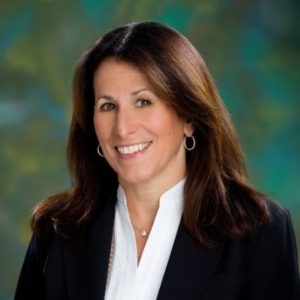
The $4.3 million raised for Federation’s Covid-19 Emergency Response Fund tells a tale of donors who came together with warp speed to care for seniors in solitude, struggling families, over-burdened Jewish institutions, and those in need of food and basic necessities.
A record of nearly 1,000 camp scholarships were awarded this year speaks to the magic of Jewish overnight camp and our community’s commitment to making camp affordable for so many.
Behind the seven Shinshinim who still came to Atlanta overcoming all of the COVID restrictions is a story about the unbelievably inspiring Israeli high school graduates taking a gap year in Atlanta before military service. Working long days in our day schools and synagogues, with our youth groups, and in our camps, the Shinshinim infuse our community with their passion and love for Israel.
These stories, and especially the people behind them — the volunteers, professionals, communal leaders, and donors — fill me with gratitude and hope.
 Federation extends warm congratulations to all of our high school graduates and also acknowledges that this has been a difficult year for them. The pandemic required students to deal with a hybrid of virtual and in-person learning. Many felt deprived of the beloved rituals that come with senior year. Social distance protocols kept friends apart. We asked Gabe Weiss, a senior at Atlanta Jewish Academy, and Lili Stadler, who is graduating from The Weber School, to share what they experienced this year, what they missed, and where they are headed next.
Federation extends warm congratulations to all of our high school graduates and also acknowledges that this has been a difficult year for them. The pandemic required students to deal with a hybrid of virtual and in-person learning. Many felt deprived of the beloved rituals that come with senior year. Social distance protocols kept friends apart. We asked Gabe Weiss, a senior at Atlanta Jewish Academy, and Lili Stadler, who is graduating from The Weber School, to share what they experienced this year, what they missed, and where they are headed next.
Lili Stadler, The Weber School:
Last March, I was a junior in high school dealing with an insane course load, the stress of taking the SAT, and was soon to be diagnosed with depression and anxiety. Now, I have overcome both of my mental illnesses, gotten into every college I applied to, and am going to Georgia Tech, my dream school next year. Being a senior amidst a global pandemic has meant a lot of things to me: it has taught me to appreciate the small things in life, such as the feeling of hugging my grandmother and catching up over a home-cooked meal, but most importantly, it has taught me to let go of the things I cannot control and make the most of what I have.
Every year, the seniors at Weber go on a month-long trip to Israel; however, this year, we did not. The trip is an opportunity to finish our high school years with a culmination of everything we have learned about friendship, Judaism, and Israel. Although there is a place in my heart that yearns to have had that experience, my friends and I have made up for it in different ways. We lost our trip to Israel, but we remain thankful for the memories we did get to make together at school and on the weekends. Being apart from one another for so long has taught us to appreciate the moments we have together before college.
Gabe Weiss, Atlanta Jewish Academy:
I chose to study remotely for my senior year due to a family health situation. As someone who’s mostly introverted, I initially looked forward to staying remote. However, losing out on the excitement of senior year felt worse than I expected. Missing events such as leading Battle of the Classes, giving a senior talk at the end of school, and even missing some privileges, such as having an exclusive senior lounge, really affected me. I realized that I will never have the opportunity to experience these privileges again.
Most importantly, I missed being able to interact with my classmates, both close friends and mere acquaintances. I know that there will be so few times that I will get to see them all again after we graduate. Additionally, learning became so much more difficult. At home, I often get distracted, have internet issues, or have a lack of motivation due to everything feeling the same and there being no distinction between school life and home life. The coronavirus situation has proven the old Yiddish phrase “Man plans, God laughs.” I may have been looking forward to experiencing being a senior in high school, but it was not destined for me. Next year I am attending the joint program between List College (JTS) and Columbia University.
By: Joanna Kobylivker
Community Organizer, Georgia Interfaith Power and Light
The Jewish Climate Action Network of Georgia (JCAN GA) is a newly formed chapter of the Massachusetts based Jewish Climate Action Network. We began as a small but concerned group of Jewish community members who came together to raise awareness and create solutions around climate change. Our diverse group represents several congregations, from spiritual leaders to climate scientists to moms and dads who simply want an earth for future generations to enjoy. We strongly believe the Atlanta Jewish community has a unique opportunity to be part of the solution.
Our specific mission is to promote environmental stewardship though Jewish community building. By coming together, we can:
How will we do this? By working with strong community partnerships both in Atlanta and around the country who are already doing this important work. We are very excited to announce a partnership with Georgia Interfaith Power and Light (GIPL) with where I will be serving as a dedicated staff member, to Joanna Kobylivker, who will engage with our Jewish community.
When will this work begin? It’s already started! JCAN GA members have already held several virtual events through partnerships with Repair the World, Limmud Atlanta and Southeast, and various congregations.
Much more is to come with the upcoming Shimta year. The Shmita Year is part of a cycle analogous to the weekly Sabbath but taking place once every seven years as opposed to every seven days. Also known as the Year of Release, Shmita invites each of us to re-examine our relationship with the earth, with the Divine, and with one another. In the Shmita year, we rest alongside the land; we share the abundance of our landscapes as equals with one another and with the wild creatures; money is deemphasized; and debts are released.
As a community, we are setting intentions and goals for how we will bring Shmita values to life in the form of environmental sustainability. Caring for our earth is part of being Jewish. From the great philosopher Maimonides to the late Lord Rabbi Jonathan Sacks, we are taught and reminded in countless texts of our duty to honor this beautiful earth that G-d created. We say prayers, celebrate holidays, and are always encouraged to be humble and grateful for what we have been given. We can demonstrate that gratitude by protecting the earth, and there is no greater time than now.



